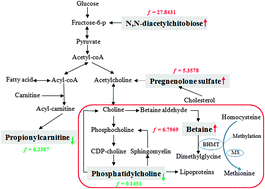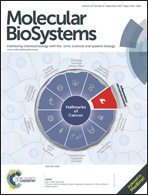Serum metabolomics reveals betaine and phosphatidylcholine as potential biomarkers for the toxic responses of processed Aconitum carmichaelii Debx†
Abstract
We recently reported that processed Aconitum carmichaelii Debx (Bai-Fu-Pian in Chinese, BFP) elicits differential toxic responses in rats under various health conditions. The present study aimed to determine the graded toxicity of BFP so as to derive a safe therapeutic rationale in clinical practice. Sensitive and reliable biomarkers of toxicity were also identified, with the corresponding metabolic pathways being unveiled. Thirty male Sprague-Dawley rats were divided into five groups (n = 6) and received oral administration of BFP extract (0.32, 0.64, 1.28 or 2.56 g kg−1 per day) or an equal volume of drinking water (control) for 15 days. The metabolomic profiles of rat serum were analyzed by liquid chromatography quadruple time-of-flight mass spectrometry (LC-Q-TOF-MS). Linear regression analysis and Ingenuity Pathway Analysis (IPA) were used to elucidate the differentiated altered metabolites and associated network relationships. Results from biochemical and histopathological examinations revealed that BFP could induce prominent toxicity in the heart, liver and kidneys at a dose of 2.56 g kg−1 per day. Betaine up-regulation and phosphatidylcholine down-regulation were detected in the serum samples of drug-treated groups in a dose-dependent manner. In summary, betaine and phosphatidylcholine could be regarded as sensitive biomarkers for the toxic responses of BFP. Perturbations of RhoA signaling, choline metabolism and free radical scavenging were found to be partly responsible for the toxic effects of the herbal drug. Based on the metabolomics findings, we could establish a safe therapeutic range in the clinical use of BFP, with promising predictions of possible drug toxicity.


 Please wait while we load your content...
Please wait while we load your content...